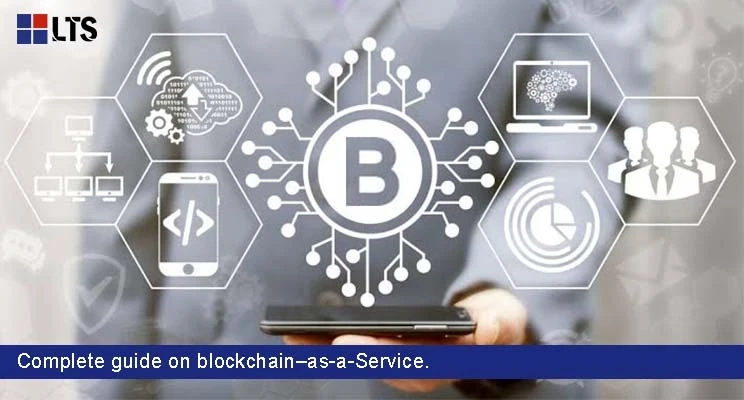A Complete Guide on Blockchain-as-a-Service
Blockchain is one of the fastest-growing IT technologies. Despite widespread practical applications, the industry still needs to realize the true potential of blockchain solutions. The question is, can Blockchain-as-a-Service (Baas) be a viable solution? Blog about Baas solutions for business functions and their business benefits. SaaS Software in Cloud Computing is a cloud-based application as a service to the end user.
Blockchain is also available in the cloud as a service business model. Why? To provide the maximum benefits of the blockchain-based service to the target audience. But what are Blockchain-as-a-Service (BaaS) solutions for business functions, and what are their uses? SaaS as cloud computing permits software applications as a service to the end users.
What is Blockchain-as-a-Service (BaaS)?
BaaS is a new evolution in blockchain technology. This is the creation and management of cloud networks by a third party. BaaS is primarily to design and develop blockchain applications. It's not just for cryptocurrencies; it witnesses all types of transactions. This is a significant development and a major milestone for businesses.
BaaS allows businesses of all types and sizes to access blockchain technology without in-house development costs. The BaaS model allows companies to utilize the services of Blockchain Technology providers to develop blockchain apps at a minimal cost.
Advantages of the BaaS Business Model
The only limitation of the BaaS model is that it requires a certain level of centralization. Why? The transaction must be routed through the host's blockchain service. Therefore, companies should reconsider whether to employ them.
Why Should Companies Use BaaS Business Models?
Organizations and individuals have been poised to use blockchain technology for years. This is a significant limitation due to technical issues and operational costs associated with developing, configuring, operating, and maintaining infrastructure. Blockchain as a service is seen as a viable solution to overcome them. Multiple industries are now integrating the BaaS solutions such as payments and transactions, supply chain management, and smart cards.
How does the Blockchain-as-a-Service Business Model Work?
The blockchain-as-a-service business model describes the process by which a third party installs, hosts, and maintains a blockchain network on behalf of an organization. Service providers offer to set up blockchain infrastructure and technology for a fee.
In many ways, the role of enterprise blockchain as a service is similar to that of web hosting providers. It allows customers to use cloud-based solutions to develop and host blockchain applications and smart contracts in provider-managed ecosystems.
Benefits of Software-as-a-Service and Application
Increased efficiency and cost-effectiveness are why many companies are turning to SaaS Software and Applications. Benefits include:
You only pay low setup and infrastructure costs for what you need, with no capital expenditures that need to be written off on your balance sheet over time.
Accessible from anywhere
Just connect to the internet; you can work from anywhere via desktop, laptop, tablet or mobile, or another network device.
Scalability
You can adapt your requirements to the number of people who need to use the system, the amount of data, and the functionality you want as your business grows.
Superior Service Level Agreements (SLAs) for availability and performance
So you're assured that the software will be available when you need it – a difficult promise for in-house teams.
A Real Application Hosted on Blockchain as a Service?
Documentation Tracking – Blockchain provides its documentation system. Keeping documents on the blockchain system ensures that each participant has equal access to the same information.Data Storage – Most decentralized blockchains require secure data storage. Blockchain's unique scalability greatly reduces the risk of data loss.Contract Execution – Combining blockchain and smart contracts can provide a platform for contract execution that supports transparency.Companies can take full advantage of blockchain without confusion when looking at real-world applications. Instead of building and operating its blockchain, a large or small business can outsource the technically complex work and focus on its core business.
Conclusion –
Blockchain-as-a Service is currently a unique way to streamline the digital transformation process. It can help your business gain a competitive advantage without investing in research, planning, and infrastructure.
0


